Is An AWS Certification Enough To Get You A Job? (Spoiler Alert - No)

If you’re in the space of learning AWS, it takes (roughly 😉) 0.3 seconds before someone recommends you get a certificate, right? But is that AWS certification alone enough to land you a job? And if not, what should you do as well?
If this is what you’ve been pondering recently, you’re in the right place. Today, we’ll go through and answer whether or not an AWS certification is in fact enough to land you a job (spoiler: it’s not) and go through the 4 steps you should be taking to ensure you land a job with your AWS certification. Is an AWS Certification enough to get you a job? No. On its own, an AWS certification is not a guarantee of a job. Job hunters in the cloud industry will need to have demonstratable hard-skills e. g. programming as well as relevant experience and soft-skills such as communication and teamwork.
Let’s start the conversation by taking a look at what an AWS certification is, then we can dig into some complications surrounding AWS certifications and unpack why an AWS certification isn’t enough on its own to land you a job.
What Is An AWS Certificate Anyway?
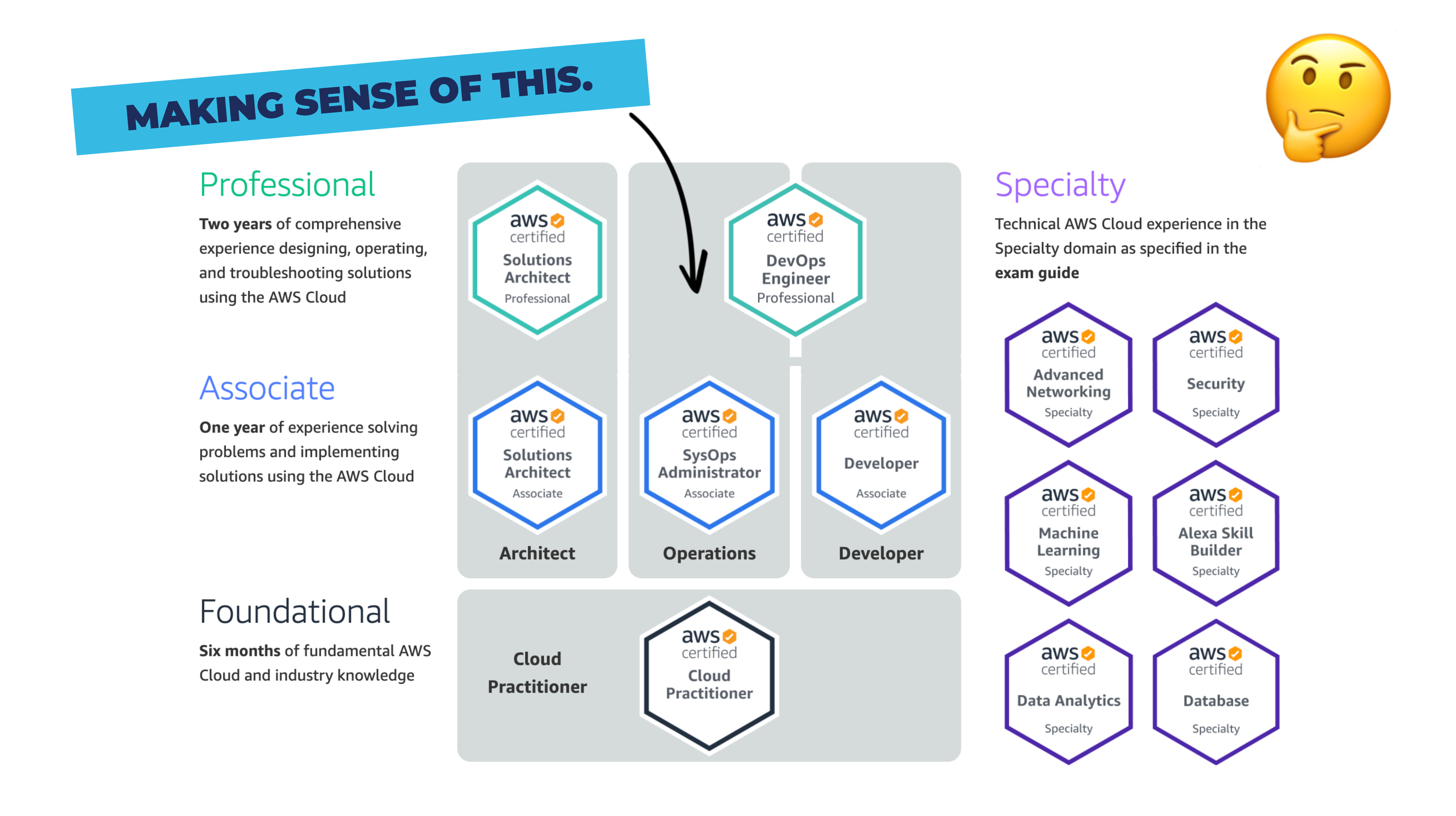
AWS certifications are a family of professional qualifications offered by cloud computing company Amazon Web Services (AWS). The certificates are popular to those in the cloud industry, and also newcomers to the cloud industry as a way to demonstrate technical cloud proficiency and AWS skills.
If you’re not already familiar with the AWS exams, I highly suggest you check out the AWS certifications preparation page on the AWS website, it has PDF overviews of each certification which explains what it is, who should take it, and the content involved. It’s a great start in understanding the certifications.
Most newcomers to the cloud industry, and/or AWS will be thinking of taking the cloud practitioner certification, followed by one of the associate certificates, usually the solutions architect certificate in order to help their job prospects.
So this all sounds pretty good so far, right? It sounds like taking an AWS certification is a great idea, and would be a wonderful tool to help out in the job hunt. So why did I say that an AWS certification isn’t enough to get a job?
Let’s take a look.
AWS Certs & The “Prior Experience” Problem
Here’s the kicker: AWS certifications aren’t designed for beginners.
The AWS certifications were always intended as a way to validate skills, building on top of existing hands-on experience. But, certifications have become—to some people—a cheap hack to fast-track a career in the cloud.
But if you end up fast-tracking anywhere, it’s to disappointment, and not a fast-track to landing a job and a fulfilling career in the cloud.
Getting certified should be the cherry on top of the cake. It should validate the knowledge and experience that you already have. That’s why I’m wondering if it’s necessary to go for all certs, since some exams require knowledge I won’t be using in the real world. — Danny (@dannysteenman) [March 10, 2021](https://twitter.com/dannysteenman/status/1369674802923995137? ref_src=twsrc%5Etfw)
When you look at the certification overview from AWS, you see that even AWS themselves say certifications expect a certain amount of experience. The confusions come because AWS doesn’t mandate, or check for the experience.
You can see these suggested years of experience over on the left side of the AWS certifications overview. It’s two years for the professional certifications, and one year for the associate certifications.
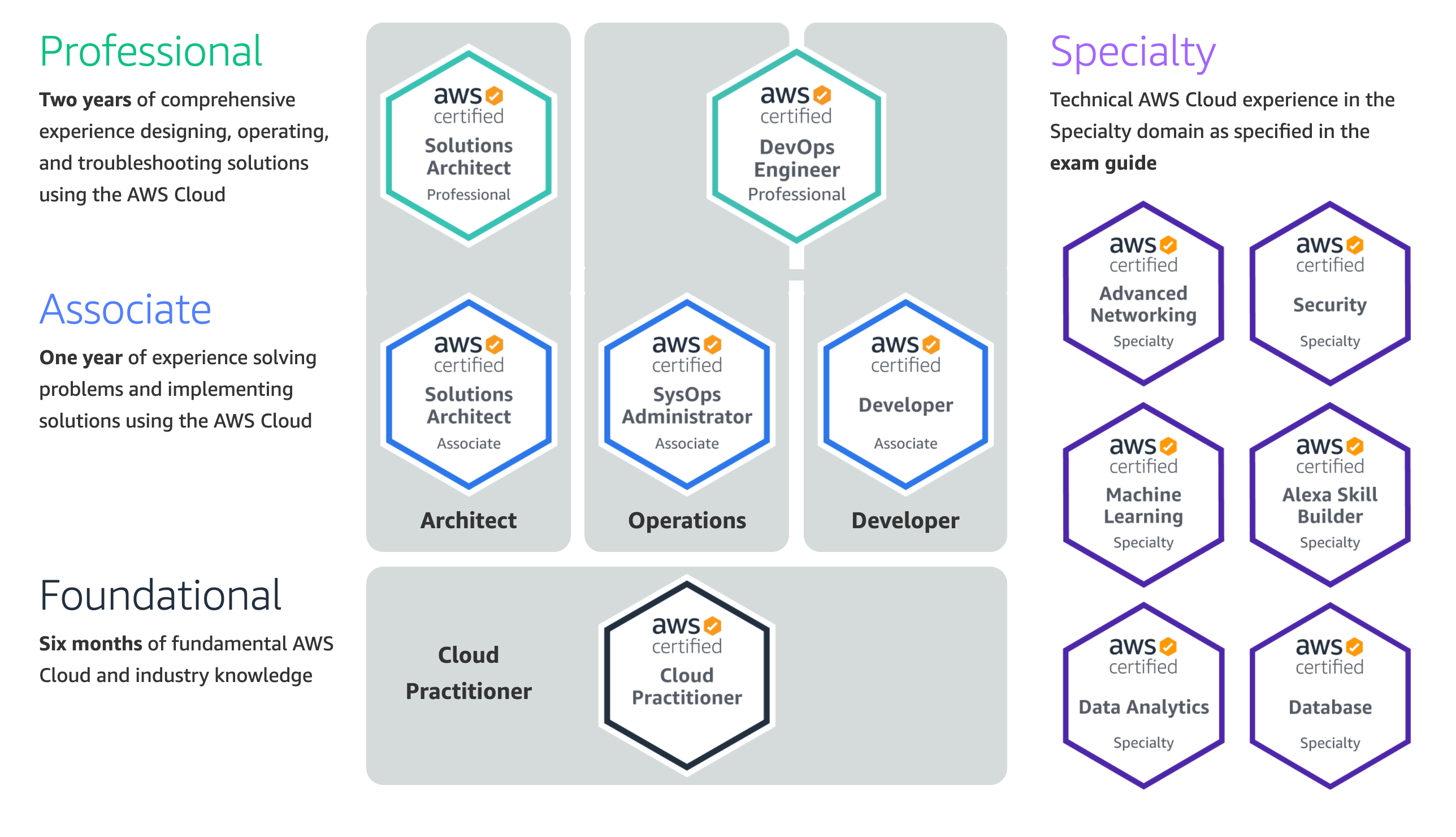
Experience is not obligatory to take an AWS exam. But, why not?
The answer is quite simple: it’s because it’s virtually impossible for AWS to validate experience prior to allowing someone to sit the exam. It’s too much headache. Instead, AWS trusts students to be practical, and honest.
Why Is AWS Not Mandating Prior Experience For AWS Certifications A Problem For You?
The problem we’re discussing today is not just a loop-hole problem with AWS and its rules. I mean—who cares, right?
But the thing is, the loop-hole with prior experience causes a problem for you.
Why? Because the cloud industry—critically, employers—know that AWS certifications do not mandate any experience, and that just about anyone can take a certification. This decreases the perceived value of AWS certifications.
You might also be surprised to learn that some companies even reject candidates with too many AWS certificates. Yes, you read that correctly.
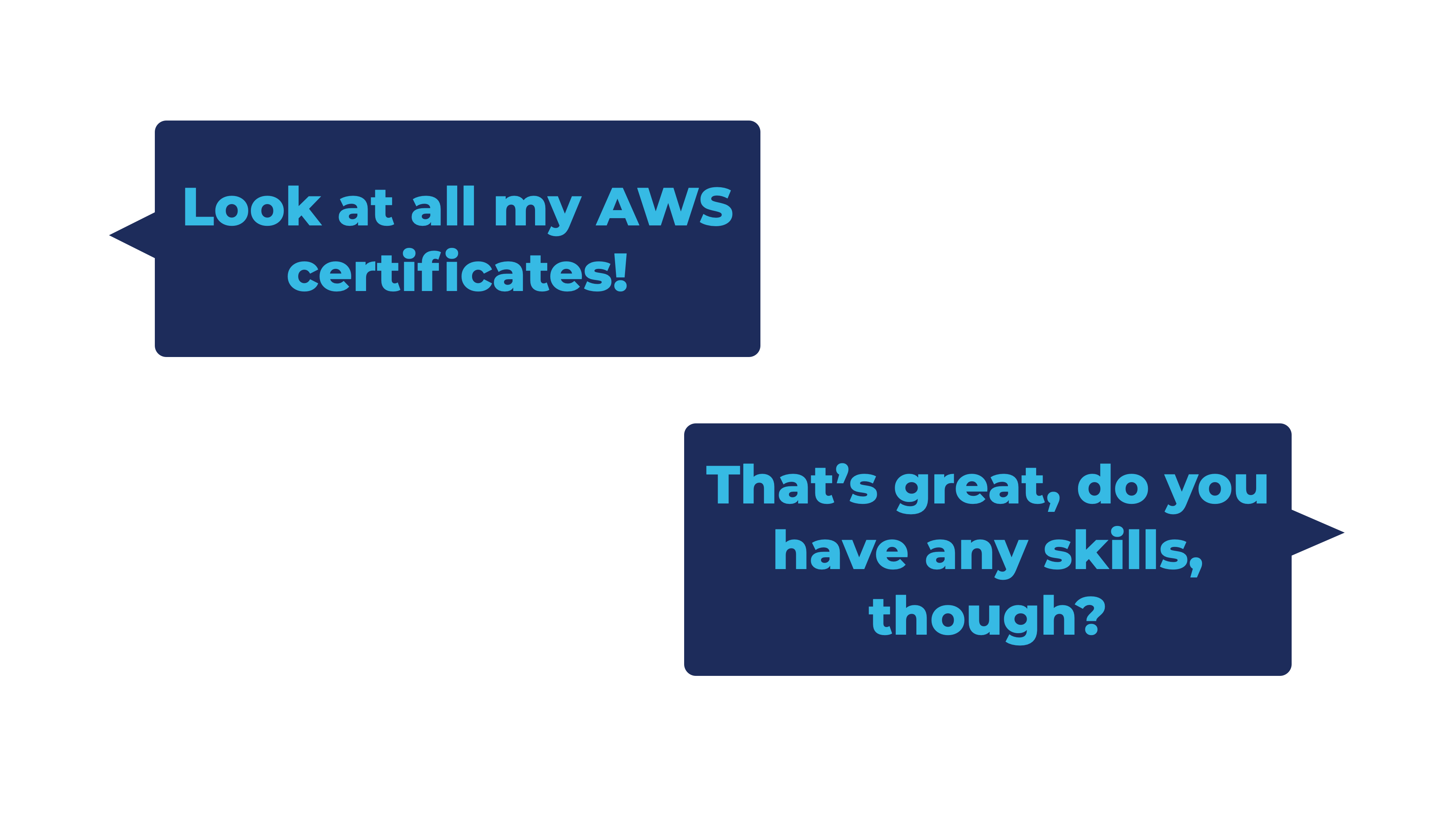
Why? Because tech companies are aware that some candidates are trying to “hack” their way in using certifications and using certifications as a way to hide the fact that they don’t have enough relevant experience.
There’s a huge difference between having the hands-on experience that’s needed—not only to do the job well—but to get you through the interview process. Employers are also aware that newcomers are trying to game the system using certificates. Tech companies aren’t foolish.
So, Are AWS Certifications Good, Or Bad?
After all this, am I saying certifications are bad? Am I saying you shouldn’t get certified? No. Not at all. Certificates have their purpose. But, what I am saying is that a certificate is not enough to land you a job on its own.
Okay… so maybe now you feel like I’ve just put a big grey cloud over your head. I understand that you’re trying to break into the cloud industry, and certificates sure do seem like a fantastic golden opportunity to get in, right?
The thing is, I’m not writing this article to just put a downer on you, it’s actually quite the opposite. I want to be honest and frank with you. So now—as promised—let’s talk through the steps you need to be taking to get the clarity and direction you need to be successful in your cloud and AWS job hunt.
If An AWS Certification (Alone) Doesn’t Get You A Job, What Does?
Now we know that an AWS certification alone won’t get you a job as it’s not enough to give employers the confidence they need that you can do the job.
How should you approach or start to think about your job hunt to be effective at landing a job in cloud?
When people come to me and ask my advice for getting any tech job—not just cloud—I recommend they take the four following steps. If you follow these steps, in order, it should give you the structure, and clarity you need.
Those four steps are: laser-focus on one job role, build evidence of hard-skills, “hack” your way to experience, and reverse engineer the hiring process.
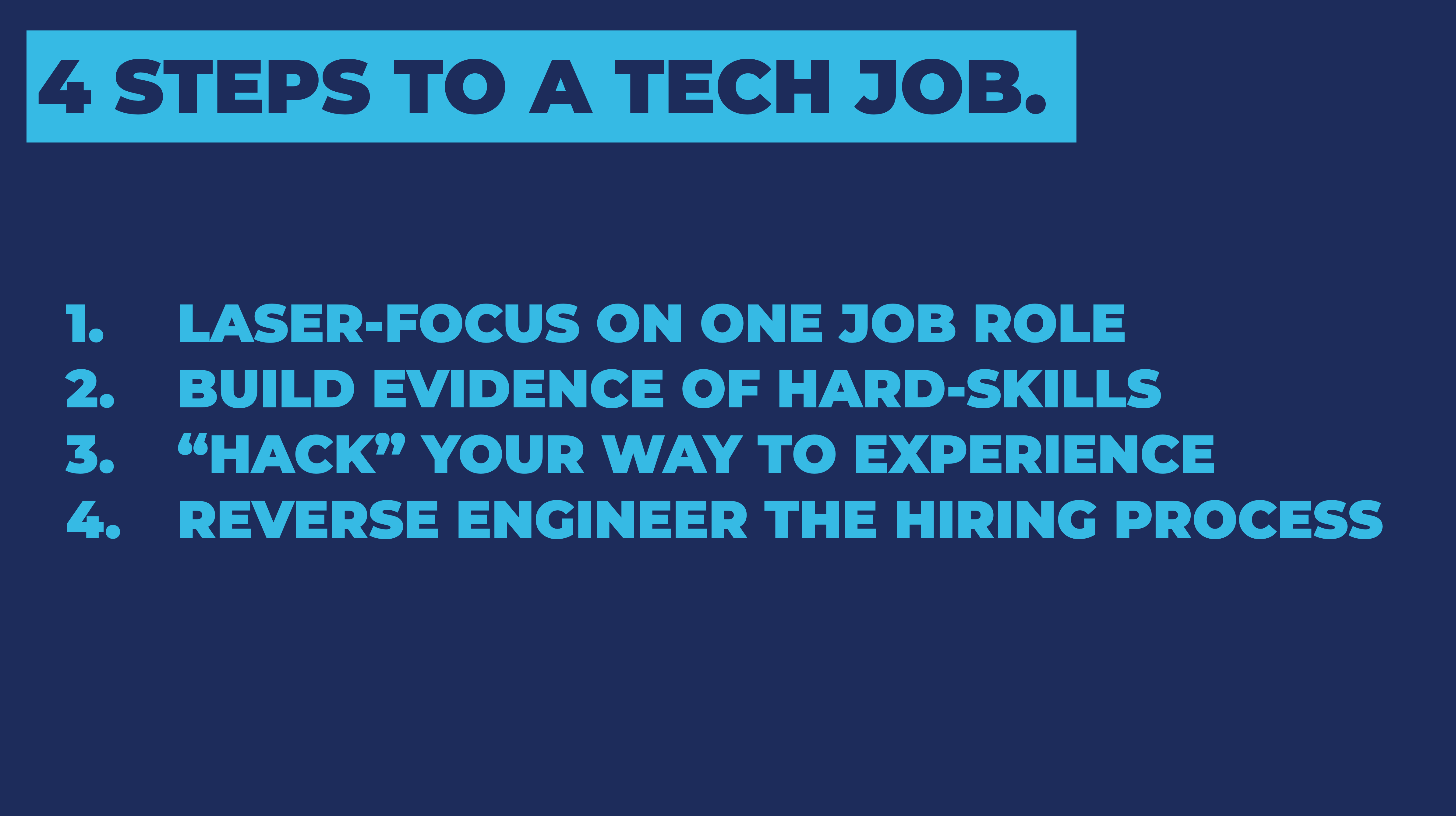
Focussing on these four steps will drastically increase your chances of landing your first job. Believe me, this four-step process is going to do a much better job than just getting a handful of certificates and hoping.
Now, don’t worry if these steps seem a little high-level and vague right now. Because now I’m going to take you through each one step-by-step. Let’s start with the first, and that’s laser-focusing on one job role.
Step 1: Laser-Focus On One Job Role
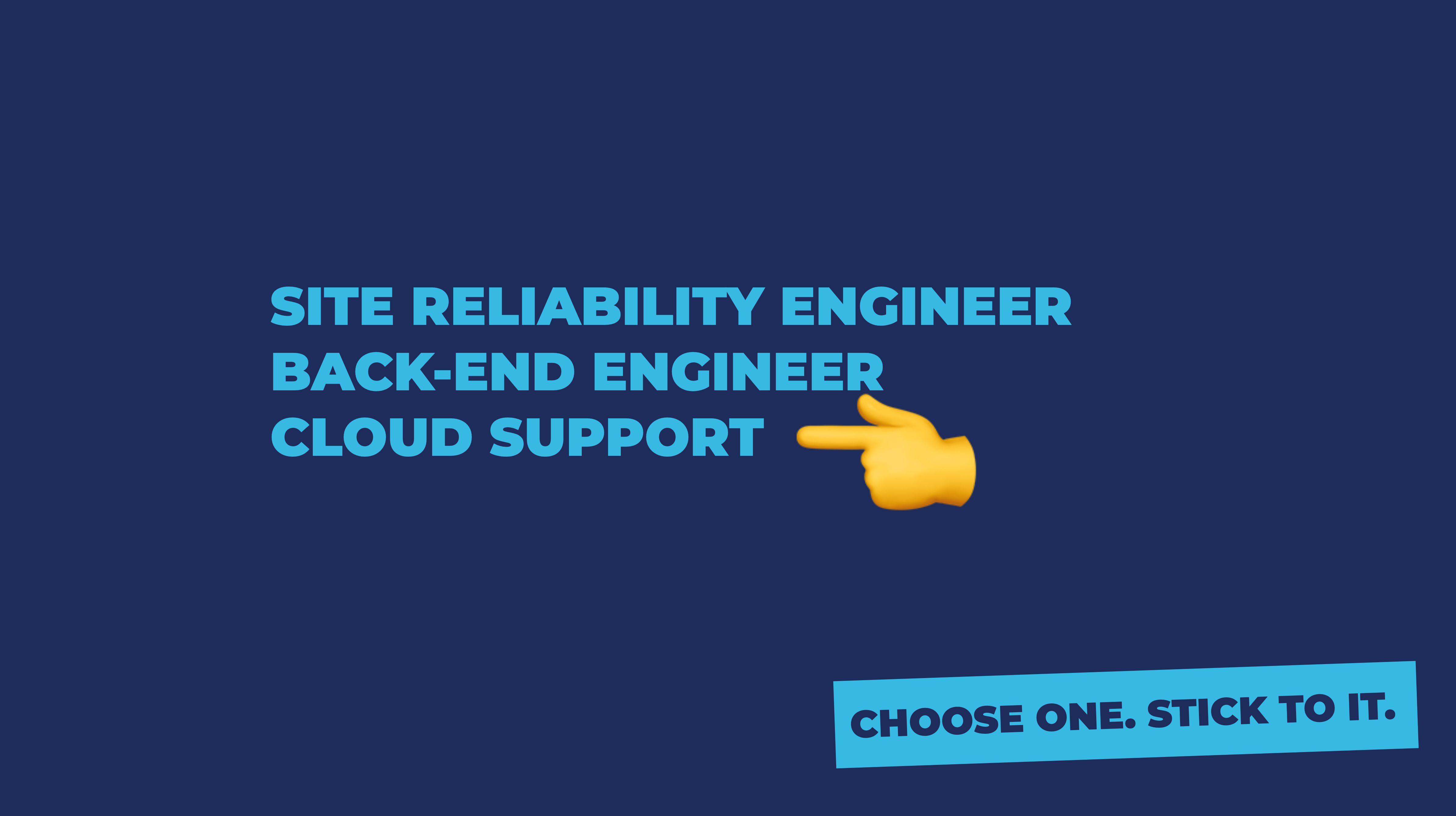
When it comes to finding a job working with AWS, you’ll want to target—as specifically as you can—a single job role. A very common mistake I see people getting into cloud making when they approach the job hunt is having too much of a “scatter-gun” approach. What do I mean?
These people are focusing too much on gathering up random collections of skills or certificates, and are not thinking enough about how these skills come together to form a single, cohesive role. The key-word here is: cohesive.
Let’s take trades as a (trite!) example: to become a brick-layer you learn the skills of a brick-layer. Whilst learning about other tangential skills to brick-laying like water piping and electric wiring has some cross-over, it’s the domain of an entirely different trade. Tech is no different.
Tech companies don’t hire for random collections of skills.
Tech companies hire for roles.
When it comes to finding a role matched with an AWS certification, there are lots to choose from, so you’ll have to do your research. There are back-end engineers, site reliability engineers (SRE), cloud support. The list goes on. And don’t worry, we’ll talk more later about how to find out more about these roles.
For this point now, it doesn’t matter as much which role you choose—what matters is that you have a clear understanding of the role you’re after and the skills you’d need to be successful in that role.
Now, at this point, I know what you’re thinking: “okay, aiming for a specific role does make sense, but that’s very generic, how do I—as an industry outsider—figure out which skills I should learn?”.
This is a great question. It can be especially hard to figure out which skills align with which roles in tech. If you’ve done research into the “DevOps” role, you know what I mean here (spoiler: no-one knows what skills are associated with “DevOps” as a role). The answer to the question is deceptively straight-forward… but you will have to do a little work and investigation!
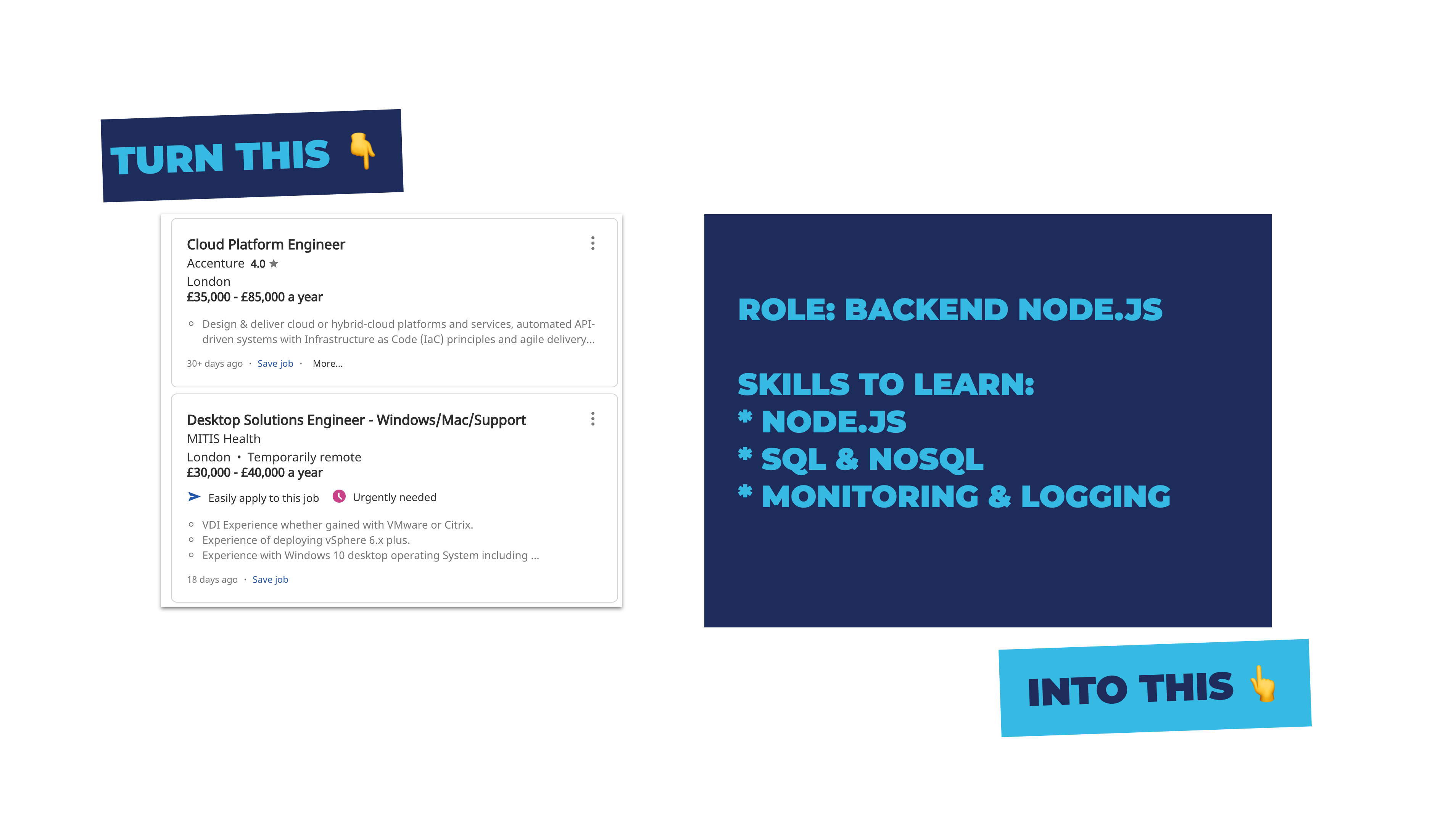
The best way to find a specific job role that matches your past experiences and expectations is by going to different job boards (for example, indeed. com) and combing through the different job descriptions. Look for jobs that match your prior experience, skills and preferences.
You want to be looking for trends and patterns between roles and skills.
For cloud roles that use AWS, try searching for roles like “back-end engineer” (sometimes also “front-end engineer”), “full-stack engineer”, “data engineer”, “cloud support”, “SRE”, “DevOps”, or “cloud engineer”. These roles should give you a good start. Pick one, and start to compile a skill list.
Once you’ve started to compile the skills, and you’ve got your role to target, you can start to form a learning plan around your skills.
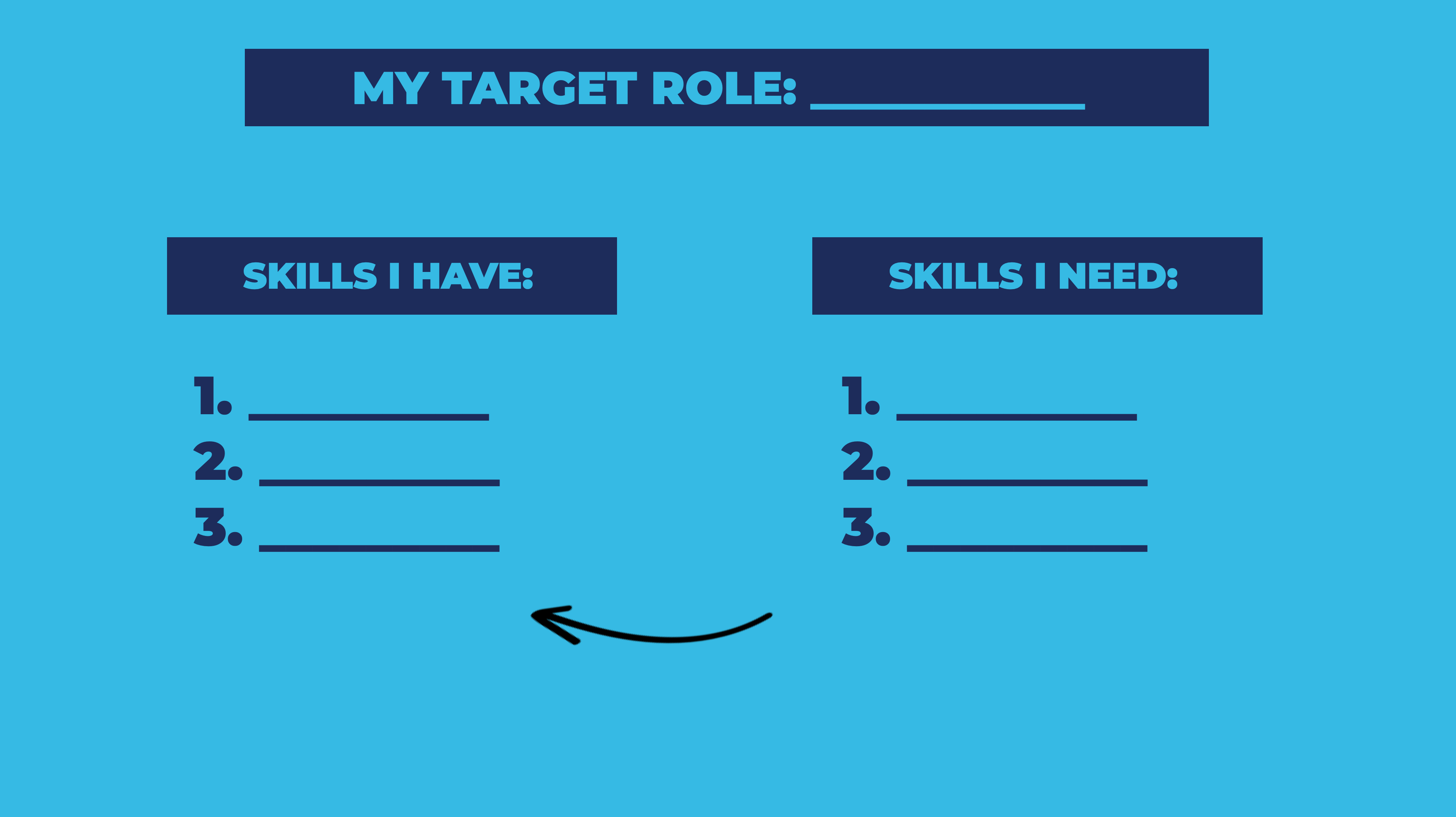
Good to know when building your learning plan is that many tech skills overlap. Learning one tool is often enough. For instance, you probably don’t need to learn AWS AND GCP—they have similar underlying principles. Or, you don’t need to learn Terraform AND CloudFormation, they’re quite similar.
Combing job descriptions is just one way to gather this list and hone your target role. There are many other great ways to do your research, like joining social media, or online communities and chatting to people about their job roles (be respectful, of course). It really doesn’t matter which approach you use to compile these skills, more that you laser-focus on a single role.
Step 2: Build Evidence Of Hard Skills
When you’re new to any tech industry (including cloud and the AWS world) one important aspect that you shouldn’t overlook is: to an employer, hiring you is a potential risk. The employer cannot be 100% sure that you do know the skills that you say you know, or that you can perform the job they need.
AWS Certifications can certainly help with this problem, as they at least show that you know something about various AWS services, but certifications are not the only aspect you should be relying on as there’s many other ways to also evidence your hard skills.
In tech, it’s surprisingly easy to show an employer that you know what you’re talking about. How can you do this? For example, you can: write articles or blogs (if you use DEV or Hashnode you don’t even need to create your own blog), contribute to open source, create videos (on YouTube), push projects to GitHub, create a portfolio. These are just ideas, and there’s many more.
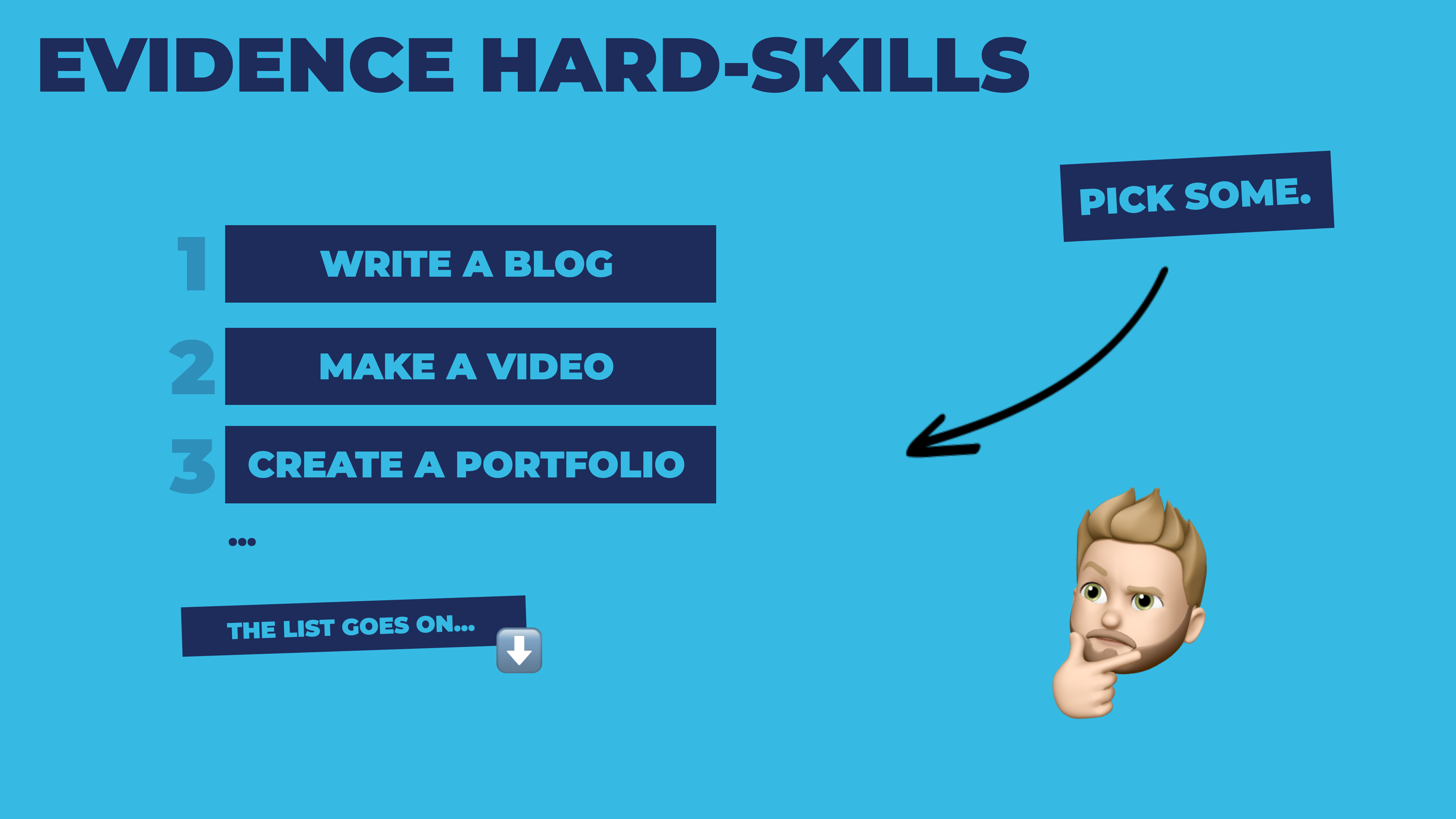
Because evidencing tech hard-skills is so simple, if you rely only on your certification, it’s likely employers will also wonder why you haven’t got any evidence of your skills shown online (if you choose not to publish any work).
Remember that to an employer, you pose a risk, so everything you can do to de-risk yourself is going to help. And building up evidence online of your hard-skills is a great way to do that.
Start to think about how you can start to evidence the skills that you identified in the first of these four steps. For instance, if you’re looking at an SRE role, can you create a small project with some cloud components and add monitoring and alerting to them, to showcase your skills? Get creative.
Now you’ve compiled your list of skills, and you’re showing evidence of them, we can move onto the elephant in the room—getting hands-on, real-world experience. What if you don’t have any? Will that hold you back? Possibly. Let’s take a look at how you can navigate the challenge of building experience.
Step 3: Hack Your Way To Experience
Now that you have a role chosen, and you’ve started to build out and evidence of your hard- skills, you’ll need to start and think about the other set of key skills that you’ll need for nearly any job: soft-skills. Soft-skills are skills like communication, teamwork, organization, and the ability to deliver on projects.
The way that employers typically measure your soft-skills is through the lens of prior experience, in combination with situational-based questions in an interview (e. g. “tell me a time when you had to manage a conflict”) so they can dig into and validate your past experience. Unlike with hard-skills, it’s difficult to evidence soft-skills. We can’t just put our soft-skills on GitHub.
But we can’t just ignore that we do need soft-skills to land a job.
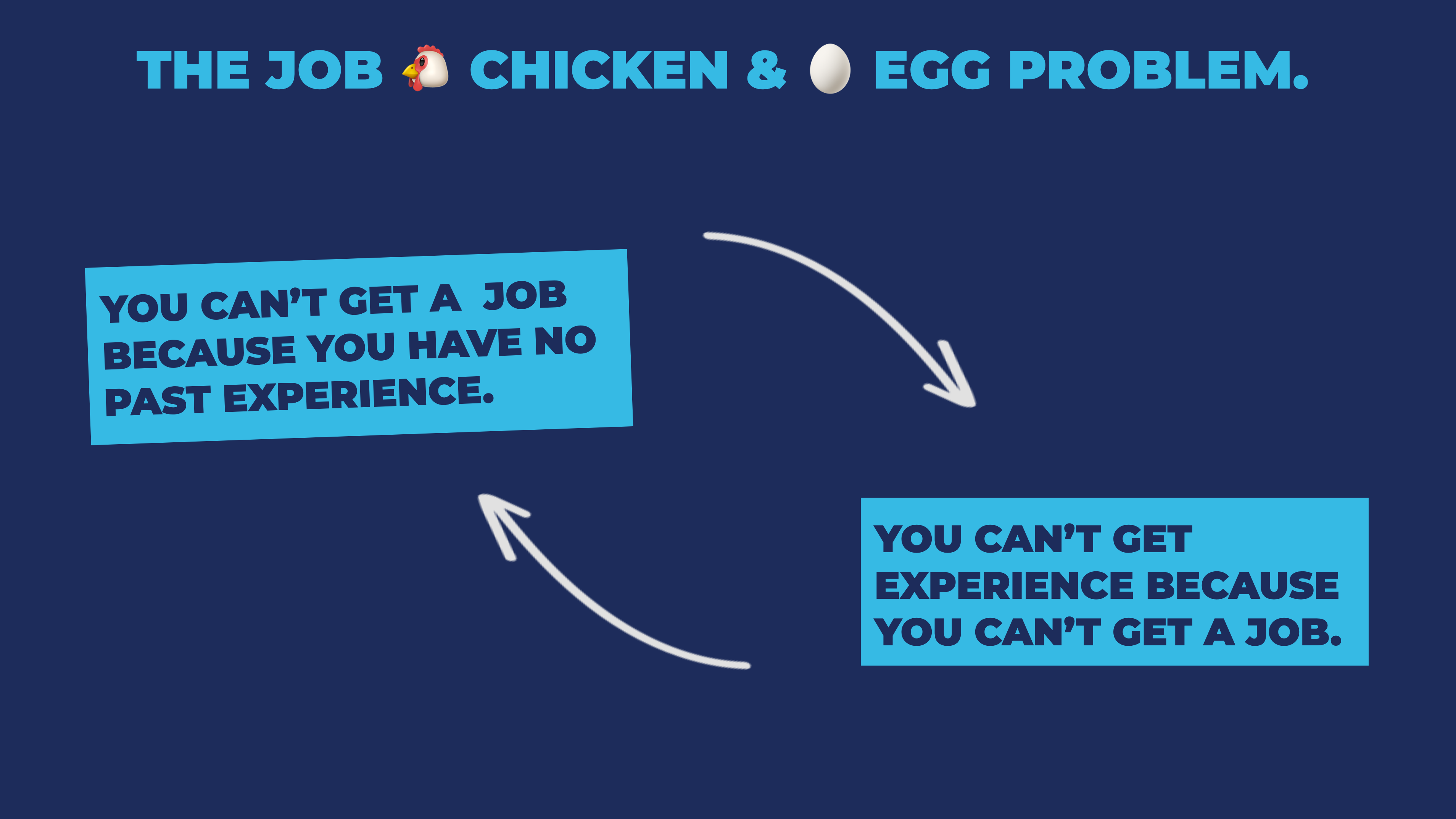
Many of you reading this article don’t have practical working experience in the cloud, with AWS, or even in tech. This is a common chicken-or-the-egg problem scenario that many job-hunters in tech face.
How do you get a job without experience? And how do you get experience without having a job? It can seem like an impossible problem to solve.
But there is a solution.
That solution? Freelance.
Now, hold up, I’m not suggesting you change your career aspirations right now and go become a freelancer. Bear with me for a moment whilst I explain how freelancing can help you overcome this chicken-or-egg scenario.
The important thing to note here is that freelance gigs/work doesn’t have the same gatekeepers that typical full-time jobs do. So getting a freelance job can be as straight-forward as finding a first client. And finding that first client can be as straight-forward as asking a friend if you can make them a website.
That’s your first client.
That’s your real-world, hands-on experience. No gatekeepers.
If you’re looking to break this chicken-or-egg scenario, this is the “hack”. Go out and find someone in your network, your family, even a neighbor will do, and find something valuable to build for them as a client. That could be a website, some marketing thing, an app integration, an automation tool, it doesn’t matter. What matters is that when you’ve delivered the work, you have real, tangible experience to add to your resume.
And yes, I know that this type of experience isn’t the same as working for Facebook or Google, but it is enough to get you in the door for that first job. And once you’re in the door, your influence and your ability to move around in the industry will quickly grow with your experience.
So don’t despair or panic if you’re sending out resumes and getting rejected for lack of experience—”hack” your way to that experience.
Now, let’s move on to the last step in the four steps—navigating the hiring process. If you’ve followed the four steps up until now, you’ll have chosen a solid role to aim for, you’ve compiled and started building skills, and you’ve started to hack your way to experience.
Onto the job hunt and hiring process.
Step 4: Reverse Engineer The Hiring Process
Okay, so we’re nearing the end of the four steps to landing a job with AWS. The last step in the process? Reverse engineering the hiring process.
What do I mean by reverse-engineering the hiring process?
When most candidates start out on the job hunting process they work forwards. Candidates think about the world from their perspective. The job they could get, the money it would bring, etc. If you came here thinking “is an AWS certification enough?” that shows you too, are thinking forwards.
But… when it comes to finding a job, it pays to think “backward”—thinking about things from the employer’s perspective.
Let’s take today’s question “Is an AWS certification enough to get a job?” and flip it around to think backward.
The question becomes: “Is a certificate valuable to an employer?”, or “Does a certificate help me do a better job for my employer?”.
See the difference?
That’s thinking backward. And thinking backward is a good thing.

When you know what things look like from the employer’s side of the table you can make sure you’re working with, and not against their processes.
By working backward—not forward—you can ensure your resume matches the job description and what the employer is ultimately after. You can ensure you know the types of questions they might ask in interviews, etc.
Okay, and right about now you might be thinking: “sounds great, but I’ve never worked in tech, so how do I know what the hiring process will look like?”.
It’s a great question. But the answer might be simpler than you think.
Think about it, you have already started the process of working backward today. If you followed step one—which, of course, you did, right?—you have chosen a cohesive set of skills to match a job description.
Step one is a great example of the working backward approach. You thought about the role and the pains the employer has, and you are focussed only on the skills the employer finds valuable, and nothing more.
So just continue this approach.
For instance, start by researching the companies you’re applying to, and mapping out their hiring process, this is how you can begin to “reverse-engineer” it. Does the tech company do coding challenges? Or take-home tests? Do they care about test-driven-development, for example? These are the questions you want to try and answer.
It’s quite common that you can find clues online about how a companies recruitment process works. Clues about the types of interview questions they might ask, or the technical challenges they might present in the interview process.
Even if you can’t find details on the exact tech company you’re applying for, tech companies based in similar locations, and of similar size will interview in very similar ways. So, if you can’t find details of the exact company you’re applying for, look for tech companies of a similar size in a similar location.
We could definitely talk about this idea of reverse-engineering the hiring process for a long-time. But, the whole idea has been written far better than I ever could in many different books and articles over time. So let me wrap up this section with one strong recommendation for where to start if you want to learn more about this topic, and that’s The Tech resume by Gergely Orosz.
In The Tech resume by Gergely Orosz you’ll find a serious gold-mine of information about how the tech hiring process works, and he walks you through how to put together a resume which means you’ll pass—at the very least—the first step in the job-hunt process, the resume screen.
Do you need to buy the book? No.
Is it a great start for understanding tech hiring processes? You bet.
So yesterday I finally found some time to sit down and give read it a full read through and being honest, the landing page doesn’t oversell it, the book is what it claims. pic. twitter. com/VZkIToYv1b — Lou 👨💻🏋️♂️🎸🚴🏻♂️🏍 (@loujaybee) [January 2, 2021](https://twitter.com/loujaybee/status/1345341956201840641? ref_src=twsrc%5Etfw)
Go Land That AWS Job 🚀
Phew, there you have it!
We covered a lot today, so if you need to, go ahead and bookmark the post so that you can come back later, because I know there’s a lot to take in.
Whilst an AWS certification isn’t exactly a guarantee that you’ll be able to land the cloud job of your dreams, it certainly is a step in the right direction.
If you structure your job-hunt on the four steps we discussed today, you’ll be positioning yourself for success in the job hunt. Need a quick reminder of the four steps? 1. laser-focus on one job role, 2. build evidence of hard-skills, 3. “hack” your way to experience, and 4. reverse engineer the hiring process.
If I haven’t completely put you off taking an AWS certification, I highly recommend this article I wrote: Best Resources For AWS Certifications: An Extensive & Opinionated Guide (So You Pass The First Time!).
And before you go, I wanted to let you know that I’ve also compiled my favorite courses, books, and more into a handy page: My (Highly!) Recommended Books & Courses To Learn Cloud Engineering which you should also find very useful!
Lastly, don’t forget that I run a monthly newsletter to keep you up-to-date with the cloud that I think you’d like.
Speak soon, cloud engineering friend!

Lou Bichard
Hey I'm Lou! I'm a Cloud Software Engineer. I created Open Up The Cloud to help people grow their careers in cloud. Find me on Twitter or LinkedIn.
See all posts →Latest posts by Lou Bichard (see all)
- 2024 Summary - A year of trips and professional work - January 9, 2025
- 2023 Summary - Data Driven Stories About The Cloud - December 31, 2023
- 2022 Summary - The Open Up The Cloud System - January 1, 2023